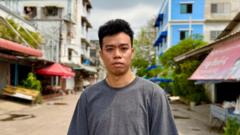The last time Soe Ko Ko Naing saw his beloved great-uncle was in July by the banks of the Irrawaddy River, just before he fled Myanmar to seek safety in Thailand. Ko Naing, who is a prominent labour rights activist and staunch opponent of the military junta, had made a tough decision to leave his home region of Sagaing – a military stronghold plagued by violence and unrest following the 2021 coup. Now, he is mourning the loss of his great-uncle, who was tragically killed in a powerful earthquake that struck Sagaing, leaving at least 2,000 dead.
“The guilt is overwhelming,” reflects the 35-year-old Ko Naing, expressing his helplessness in the wake of the disaster. “I feel I should be able to help my people.” His feelings of remorse resonate with many in the diaspora, particularly the 4.3 million Myanmar nationals living in Thailand. Many of these individuals, driven from their homeland by the ongoing civil strife, now find themselves grappling with emotional turmoil from afar.
Samut Sakhon, a coastal town populated by these migrant workers, tells a tale of shared grief and apprehension. As workers flood local markets, the weight of the earthquake’s toll hangs heavy. Yin Yin, a 30-year-old factory worker, laments, “We’ve seen terrible footage from Myanmar, but we can do little but watch.” Thant Zin, a shop owner, mourns historic pagodas lost to the quake, stating simply, “What a disaster!”
Thousands of kilometers away, the earthquake’s quake could even be felt by Ko Naing, who was shaken awake that fateful Friday. Initial news was grim as communication infrastructure struggled to respond to the crisis. It was not until the day after the quake that he learned of the fate of his loved ones—most were safe, but his great-aunt perished, and his closely-knit relationship with his great-uncle, his source of support and inspiration, was shattered with his loss.
“This was the man who encouraged me through the toughest challenges,” he reminisced. “He was my personal news contact during the conflict, and we bonded over our shared belief in resistance.” The destruction wrought by the earthquake is only compounded by the military’s ongoing violence against those opposing them, exacerbating already dire living conditions for those still in Myanmar.
Like many who have sought refuge in Thailand, Ko Naing’s journey was filled with peril as he fled with his wife and young son, avoiding detection by military forces. “Even now, I feel deeply depressed,” he admits. “The pandemic, the coup, massacres—these have all grieved our people. And now, this earthquake adds another layer to the pain.”
Despite the emotional burden weighing heavily on them, the Myanmar diaspora is not idle. Inspired by resilience and collective need for healing, Ko Naing and others are rallying support, collecting donations, and mobilizing efforts to provide humanitarian aid to quake survivors and affected construction workers in Thailand. “If we succumb to despair, we're unable to help our people. It’s vital to channel our grief into support and action,” he stated determinedly.
In the face of disaster and continued hardship, the Myanmar diaspora is learning to navigate their pain while seeking ways to bridge the distance, uniting in a common cause to uplift their compatriots back home. Together, they aim to foster a spirit of hope and recovery, even in the wake of colossal loss.



















